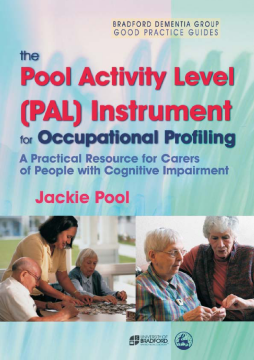
Additional Information
Book Details
Abstract
The Pool Activity Level (PAL) Instrument has become generally used as the framework for activity-based care systems in a variety of health and social care settings for people with cognitive impairments. The Instrument is recommended for daily living skills training and activity planning in the National Institute for Health and Clinical Excellence Clinical Guideline for Dementia (NICE, 2006). The PAL checklist has also been proved valid and reliable by a recent research study. This third edition includes valuable new material together with the Instrument itself and the photocopiable activity checklists and plans that help to match users' abilities with activities. A new section provides a selection of potential activities together with information on obtaining the necessary resources. The author includes guidance for carrying out these activities with individuals of different ability levels as revealed by the PAL Instrument Checklist. An essential resource for any practitioner or carer wanting to provide fulfilling occupation for clients with cognitive impairments.
Table of Contents
| Section Title | Page | Action | Price |
|---|---|---|---|
| Prelims (Praise for the book, Contents, Tables, Boxes, Figures, Preface by Gordon Prain and Henk de Zeeuw, Acronyms and abbreviations) | |||
| 1. Gender in urban agriculture: an introduction | |||
| Alice Hovorka, Henk de Zeeuw, Mary Njenga | |||
| PART I: CASE STUDIES | |||
| 2. Gender dimensions of urban and peri-urban agriculture in Hyderabad, India | |||
| Gayathri Devi, Stephanie Buechler | |||
| 3. Gender in jasmine flower-garland livelihoods in peri-urban Metro Manila, Philippines | |||
| Raul Boncodin, Arma Bertuso, Jamie Gallentes, Dindo Campilan, Rehan Abeyratne, Helen Dayo | |||
| 4. Gender and urban agriculture: the case of Accra, Ghana | |||
| Lesley Hope, Olufunke Cofie, Bernard Keraita, Pay Drechsel | |||
| 5. Gender in urban food production in hazardous areas in Kampala, Uganda | |||
| Grace Nabulo, Juliet Kiguli, Lilian Kiguli | |||
| 6. Gender dynamics in the Musikavanhu urban agriculture movement, Harare, Zimbabwe | |||
| Percy Toriro | |||
| 7. Key gender issues in urban livestock keeping and food security in Kisumu, Kenya | |||
| Zarina Ishani | |||
| 8. Urban agriculture, poverty alleviation, and gender in Villa María del Triunfo, Peru | |||
| Noemí Soto, Gunther Merzthal, Maribel Ordones, Milagros Touzet | |||
| 9. Gender perspectives in organic waste recycling for urban agriculture in Nairobi, Kenya | |||
| Kuria Gathuru, Mary Njenga, Nancy Karanja, Patrick Munyao | |||
| 10. Urban agriculture as a strategy to promote equality of opportunities and rights for men and women in Rosario, Argentina | |||
| Mariana Ponce, Lucrecia Donoso | |||
| 11.The role of women-led micro-farming activities in combating HIV/AIDS in Nakuru, Kenya | |||
| Mary Njenga, Nancy Karanja, Kuria Gathuru, Samwel Mbugua, Naomi Fedha, Bernard Ngoda | |||
| 12. Gender dynamics of fruit and vegetable production and processing in peri-urban Magdalena, Sonora, Mexico | |||
| Stephanie Buechler | |||
| 13. Urban agriculture and gender in Carapongo, Lima, Peru | |||
| Blanca Arce, Gordon Prain, Luis Maldonado | |||
| 14. Gender and urban agriculture in Pikine, Senegal | |||
| Gora Gaye, Mamadou Ndong Toure | |||
| PART II: GUIDELINES FOR GENDER MAINSTREAMING IN URBAN AGRICULTURE RESEARCH AND DEVELOPMENT PROJECTS | |||
| 15. Incorporating gender in urban agriculture projects | |||
| Alice Hovorka, Henk de Zeeuw, Mary Njenga | |||
| 16. Beyond the project cycle: institutionalizing gendermainstreaming | |||
| Alice Hovorka, Henk de Zeeuw, Mary Njenga | |||
| 17. Tool box for gender-sensitive urban agriculture projects | |||
| Alice Hovorka, Henk de Zeeuw, Mary Njenga | |||
| Back Matter (Resources, List of Contributors, Index) |
